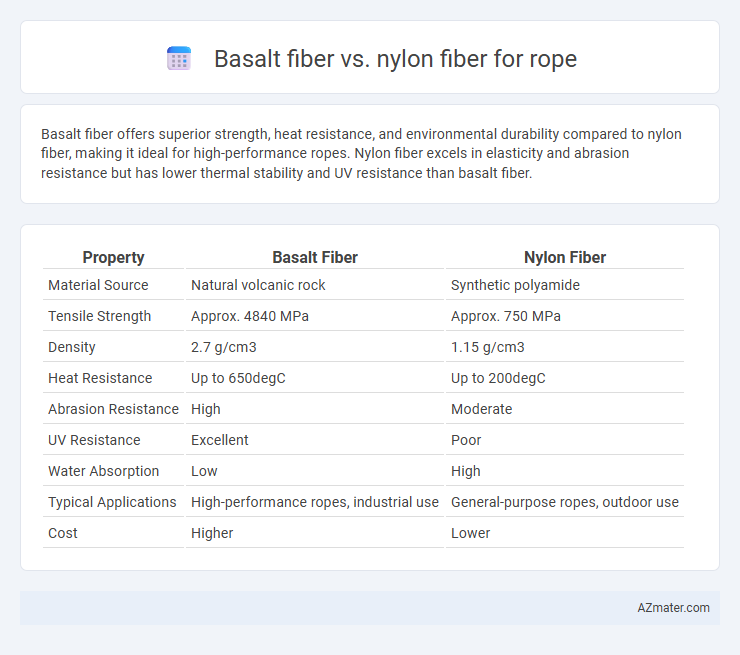Basalt fiber offers superior strength, heat resistance, and environmental durability compared to nylon fiber, making it ideal for high-performance ropes. Nylon fiber excels in elasticity and abrasion resistance but has lower thermal stability and UV resistance than basalt fiber.
Table of Comparison
| Property | Basalt Fiber | Nylon Fiber |
|---|---|---|
| Material Source | Natural volcanic rock | Synthetic polyamide |
| Tensile Strength | Approx. 4840 MPa | Approx. 750 MPa |
| Density | 2.7 g/cm3 | 1.15 g/cm3 |
| Heat Resistance | Up to 650degC | Up to 200degC |
| Abrasion Resistance | High | Moderate |
| UV Resistance | Excellent | Poor |
| Water Absorption | Low | High |
| Typical Applications | High-performance ropes, industrial use | General-purpose ropes, outdoor use |
| Cost | Higher | Lower |
Introduction to Basalt Fiber and Nylon Fiber
Basalt fiber is a natural, eco-friendly material derived from volcanic rock, known for its high tensile strength, excellent thermal resistance, and superior durability, making it ideal for heavy-duty rope applications. Nylon fiber, a synthetic polymer, offers outstanding elasticity, abrasion resistance, and moisture absorption properties, frequently used in ropes requiring flexibility and resilience. Comparing these fibers highlights basalt's superior heat tolerance and environmental benefits, while nylon excels in flexibility and impact resistance.
Material Composition and Manufacturing Processes
Basalt fiber ropes are made from natural volcanic rock, melted and extruded into fibers, offering high tensile strength and excellent heat resistance thanks to their inorganic composition. Nylon fiber ropes consist of synthetic polyamides produced through polymerization and extrusion, providing superior elasticity and abrasion resistance due to their organic polymer structure. The manufacturing of basalt fibers involves high-temperature melting and mechanical drawing, while nylon fibers are produced via chemical synthesis and melt-spinning processes, influencing their respective durability and performance in rope applications.
Mechanical Strength and Durability Comparison
Basalt fiber exhibits superior mechanical strength compared to nylon fiber, with tensile strength reaching up to 2,800 MPa versus nylon's typical 75 MPa, making basalt fiber ropes ideal for heavy-duty applications. In terms of durability, basalt fiber offers excellent resistance to heat, UV radiation, and chemical corrosion, maintaining integrity under harsh environmental conditions, whereas nylon fibers tend to degrade with prolonged UV exposure and chemical contact. These performance differences make basalt fiber ropes highly suitable for industrial use where strength and longevity are critical.
Resistance to Environmental Factors
Basalt fiber exhibits superior resistance to UV radiation, chemicals, and high temperatures compared to nylon fiber, making it ideal for ropes exposed to harsh environmental conditions. Nylon fiber tends to absorb moisture, leading to reduced strength and potential degradation when used outdoors for extended periods. Basalt fiber's natural resilience against corrosion and environmental wear ensures enhanced durability and longevity in marine, industrial, and extreme weather applications.
Weight and Flexibility Characteristics
Basalt fiber ropes are notably heavier than nylon fiber ropes, with basalt having a density around 2.7 g/cm3 compared to nylon's lighter 1.15 g/cm3, affecting overall weight in applications. In terms of flexibility, nylon fiber ropes exhibit superior elasticity and bendability, making them easier to handle and more resistant to abrasion under dynamic loads. Basalt fiber ropes, while stronger and more heat resistant, tend to be stiffer and less flexible, which can limit their use where high flexibility is essential.
Thermal and Chemical Resistance
Basalt fiber exhibits superior thermal resistance withstanding temperatures up to 982degC without degradation, making it ideal for high-heat rope applications. Nylon fiber offers lower thermal resistance, typically melting around 220degC, which limits its use in high-temperature environments. Chemically, basalt fiber demonstrates excellent resistance to acids, alkalis, and solvents, whereas nylon is more susceptible to damage from strong acids and certain chemicals, affecting rope durability.
Cost-Effectiveness and Availability
Basalt fiber offers superior strength and heat resistance compared to nylon fiber, making it ideal for high-performance rope applications but typically comes at a higher cost. Nylon fiber is widely available and more affordable, providing good flexibility and durability for general-purpose ropes, making it cost-effective for everyday use. The decision between basalt and nylon fiber ropes hinges on balancing budget constraints with performance requirements and regional availability of materials.
Applications in Rope Manufacturing
Basalt fiber offers superior heat resistance, chemical stability, and high tensile strength, making it ideal for industrial and marine rope applications where durability and fire resistance are critical. Nylon fiber provides excellent elasticity, abrasion resistance, and impact strength, suited for dynamic loads in climbing ropes, safety harnesses, and sports equipment. Manufacturers choose basalt fiber for long-lasting, high-performance ropes used in harsh environments, while nylon is preferred for flexible, shock-absorbing ropes requiring regular handling and stretch.
Sustainability and Environmental Impact
Basalt fiber ropes offer superior sustainability due to their natural volcanic rock origin, which requires less energy-intensive processing compared to synthetic nylon fibers derived from petroleum. Basalt fibers are fully recyclable and biodegradable, resulting in a significantly lower environmental footprint during production and disposal. Nylon fiber ropes, while durable, contribute to microplastic pollution and rely on non-renewable fossil fuels, making basalt fiber a more eco-friendly choice for environmentally conscious rope manufacturing.
Which Fiber is Best for Rope?
Basalt fiber offers superior tensile strength, heat resistance, and environmental durability compared to nylon fiber, making it ideal for high-performance ropes in industrial and marine applications. Nylon fiber provides excellent elasticity and abrasion resistance, suitable for dynamic loads and general-purpose ropes. Choosing the best fiber depends on rope use: basalt fiber is preferred for extreme conditions, while nylon excels in flexibility and shock absorption.

Infographic: Basalt fiber vs Nylon fiber for Rope
 azmater.com
azmater.com